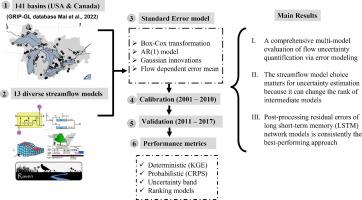当前位置:
X-MOL 学术
›
J. Hydrol.
›
论文详情
Our official English website, www.x-mol.net, welcomes your feedback! (Note: you will need to create a separate account there.)
A multi-model evaluation of probabilistic streamflow predictions via residual error modelling
Journal of Hydrology ( IF 6.4 ) Pub Date : 2024-04-03 , DOI: 10.1016/j.jhydrol.2024.131152 Jonathan Romero-Cuellar , Rezgar Arabzadeh , James R. Craig , Bryan A. Tolson , Juliane Mai
Journal of Hydrology ( IF 6.4 ) Pub Date : 2024-04-03 , DOI: 10.1016/j.jhydrol.2024.131152 Jonathan Romero-Cuellar , Rezgar Arabzadeh , James R. Craig , Bryan A. Tolson , Juliane Mai

|
Probabilistic streamflow predictions are valuable tools for predictive uncertainty estimation, hydrologic risk management, and support for decision-making in water resources. Usually, predictive uncertainty quantification is developed and assessed using only a single hydrological model, making it difficult to generalize to other model configurations. To tackle this issue, we assess changes in the model performance ranking of diverse streamflow models by applying a residual error model post-processing approach to multiple basins and multiple models. This assessment employed 141 basins from the Great Lakes watershed covering the USA and Canada, and 13 diverse streamflow models, which are evaluated using deterministic and probabilistic performance metrics. As the first study to implement probabilistic methods to diverse streamflow models applied to a multitude of basins, the analysis here examines the dependence of probabilistic streamflow estimation quality on model quality. Our findings show that streamflow model choice influences the robustness of probabilistic predictions. It was found that moving from deterministic to probabilistic predictions using a post-processing approach does not change the streamflow model performance ranking for the best and worst deterministic models, but models of intermediate rank in deterministic evaluation do not have consistent ranking when evaluated in probabilistic mode. Post-processing residual errors of long short-term memory (LSTM) network models are consistently the best-performing model in terms of deterministic and probabilistic metrics. This study highlights the significance of combining deterministic streamflow model predictions with residual error models for improving the quality and increasing the value of hydrological predictions, quantifying uncertainty, and facilitating decision-making in operational water management. It also clarifies the degree to which probabilistic predictions depend upon good model performance and can compensate for poor model performance.
中文翻译:

通过残差建模对概率性水流预测进行多模型评估
概率性水流预测是预测不确定性估计、水文风险管理和支持水资源决策的重要工具。通常,预测不确定性量化仅使用单个水文模型进行开发和评估,因此很难推广到其他模型配置。为了解决这个问题,我们通过对多个流域和多个模型应用残差模型后处理方法来评估不同水流模型的模型性能排名的变化。该评估采用了覆盖美国和加拿大的五大湖流域的 141 个流域以及 13 个不同的水流模型,并使用确定性和概率性性能指标进行评估。作为第一项对应用于多个流域的不同水流模型实施概率方法的研究,这里的分析检查了概率水流估计质量对模型质量的依赖性。我们的研究结果表明,水流模型的选择会影响概率预测的稳健性。研究发现,使用后处理方法从确定性预测转向概率性预测不会改变最佳和最差确定性模型的流模型性能排名,但确定性评估中的中间排名模型在概率模式下评估时没有一致的排名。就确定性和概率指标而言,长短期记忆 (LSTM) 网络模型的后处理残留误差始终是性能最佳的模型。本研究强调了将确定性水流模型预测与残差模型相结合对于提高水文预测的质量和价值、量化不确定性以及促进运营用水管理决策的重要性。它还阐明了概率预测在多大程度上依赖于良好的模型性能,并且可以弥补较差的模型性能。
更新日期:2024-04-03
中文翻译:

通过残差建模对概率性水流预测进行多模型评估
概率性水流预测是预测不确定性估计、水文风险管理和支持水资源决策的重要工具。通常,预测不确定性量化仅使用单个水文模型进行开发和评估,因此很难推广到其他模型配置。为了解决这个问题,我们通过对多个流域和多个模型应用残差模型后处理方法来评估不同水流模型的模型性能排名的变化。该评估采用了覆盖美国和加拿大的五大湖流域的 141 个流域以及 13 个不同的水流模型,并使用确定性和概率性性能指标进行评估。作为第一项对应用于多个流域的不同水流模型实施概率方法的研究,这里的分析检查了概率水流估计质量对模型质量的依赖性。我们的研究结果表明,水流模型的选择会影响概率预测的稳健性。研究发现,使用后处理方法从确定性预测转向概率性预测不会改变最佳和最差确定性模型的流模型性能排名,但确定性评估中的中间排名模型在概率模式下评估时没有一致的排名。就确定性和概率指标而言,长短期记忆 (LSTM) 网络模型的后处理残留误差始终是性能最佳的模型。本研究强调了将确定性水流模型预测与残差模型相结合对于提高水文预测的质量和价值、量化不确定性以及促进运营用水管理决策的重要性。它还阐明了概率预测在多大程度上依赖于良好的模型性能,并且可以弥补较差的模型性能。



























 京公网安备 11010802027423号
京公网安备 11010802027423号